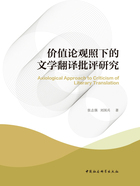
0.1 Research Background
A survey of the practice of translation criticism tells us that the situation described by Reiss has not changed much during the past decades.Criticisms were made either according to a certain moral code or a certain aesthetic standard.They were either based on critic's own experience,impression or on a certain criterion relying largely on a certain translation theory.Some of them focus on the appreciation of a translation,others on finding faults.Some are quantitative while others qualitative.Some stay at the technique level,others at textual or cultural levels.Theoretical studies on translation criticism are inadequate as well compared with the large number of translated texts and practice of translation criticism.Though with the development of Translation Studies at home and abroad,more systematic studies on translation criticism concerning its basic theories is underway(Yang Xiaorong 2005),so far as criticism of literary translation is concerned,it remains a subject that has not been established(Wang Hongyin 2006; Lv Jun & Hou Xiangqun 2009; Liu Yunhong & Xu Jun 2014).Criticism of literary translation is even more underdeveloped compared with the large number of translations of literary works and criticisms of non-literary translation generally known as translation quality assessment(TQA).Due to partly the short history of Translation Studies as an independent discipline,and partly to the complexity of literary translation itself,study of criticism of literary translation is far from systematic and is still in its infancy.On the one hand,in the net-era and the current context of globalization there have been more and more cultural exchanges and more and more literary translations.On the other hand,excellent translations and criticisms are in a small number.Ever since the 1980s postmodernism has greatly influenced the field of Translation Studies.As post-structuralism and deconstructionism became prevailing,traditional philologist and structuralist paradigms were marginalized and there appeared various cultural approaches which view translation as a cultural and political event rather than a linguistic activity.Polysystem theory and the manipulation school analyze the mechanisms of canonization,and reveal the manipulation to which the foreign texts may be submitted in the process of their entering the target cultural system.Feminist approach carries out a rereading and rewriting of the existing translation to recover women's works “lost” in the patriarchic canon,to call people's attention to the subjectivity of the translator,especially the female translator for the purpose of achieving political visibility.Postcolonialist theories view translation both as a tool for the maintenance of colonialism,reinforcing the hegemony of the colonizer and for dehegemonizing the cultural hegemony and any form of ethno-centrism.The Brazilian “cannibalism” encourages translators to devour the language of the colonizers to produce “a new purified and energized form that is appropriate to the needs of the native peoples”(Munday 2001: 136;).Thus,translation is seen “as the battleground and exemplification of the postcolonial context”(Munday,Pinto& Blakesley 2022: 178).These approaches offer various,sometimes conflicting,criteria for criticizing literary translation,and some of them with radical individual constructivism and deconstructionism as their philosophical foundation have almost made “translation criteria” a meaningless term,dethroning the “author” and the“original text” on which the traditional criteria are based.Translation has thus been made a “free play” of translators and readers as meaning has become inderterminate and “anything goes”.The plurality of criteria has brought forth people's doubt about the scientificity and objectivity of any criticism of literary translation.Public readers,translation students and some translation studies scholars can not help feeling perplexed and puzzled over the issue of translation criteria and criteria for criticism.This has obviously put the study of criticism of literary translation at stake and makes us rethink about our previous approaches.